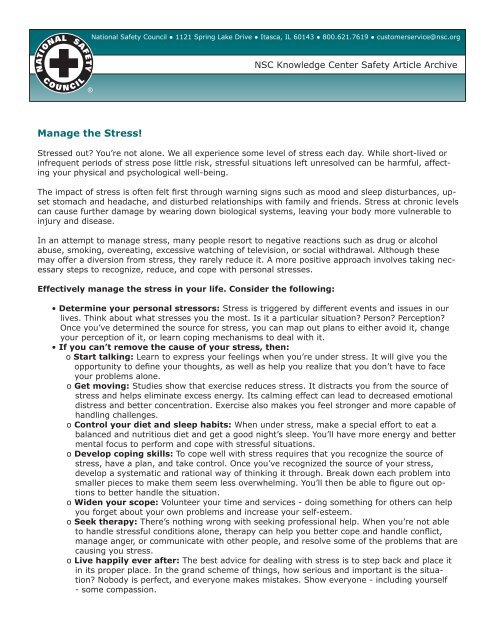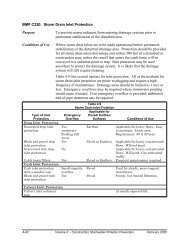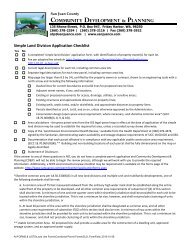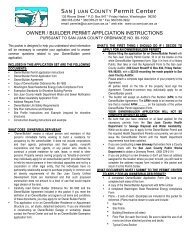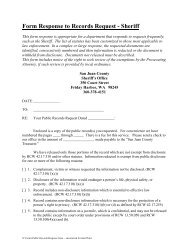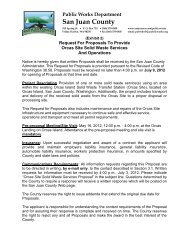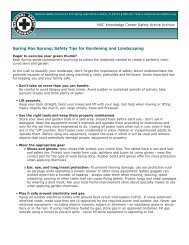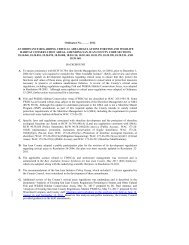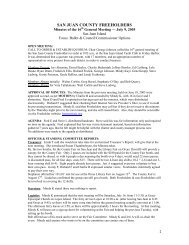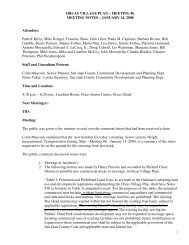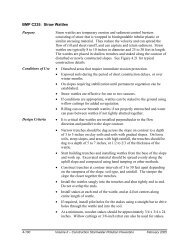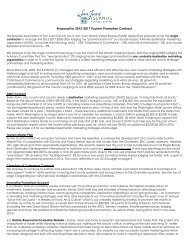Manage the Stress!
Manage the Stress!
Manage the Stress!
You also want an ePaper? Increase the reach of your titles
YUMPU automatically turns print PDFs into web optimized ePapers that Google loves.
National Safety Council ● 1121 Spring Lake Drive ● Itasca, IL 60143 ● 800.621.7619 ● customerservice@nsc.org<br />
NSC Knowledge Center Safety Article Archive<br />
<strong>Manage</strong> <strong>the</strong> <strong>Stress</strong>!<br />
<strong>Stress</strong>ed out You’re not alone. We all experience some level of stress each day. While short-lived or<br />
infrequent periods of stress pose little risk, stressful situations left unresolved can be harmful, affecting<br />
your physical and psychological well-being.<br />
The impact of stress is often felt first through warning signs such as mood and sleep disturbances, upset<br />
stomach and headache, and disturbed relationships with family and friends. <strong>Stress</strong> at chronic levels<br />
can cause fur<strong>the</strong>r damage by wearing down biological systems, leaving your body more vulnerable to<br />
injury and disease.<br />
In an attempt to manage stress, many people resort to negative reactions such as drug or alcohol<br />
abuse, smoking, overeating, excessive watching of television, or social withdrawal. Although <strong>the</strong>se<br />
may offer a diversion from stress, <strong>the</strong>y rarely reduce it. A more positive approach involves taking necessary<br />
steps to recognize, reduce, and cope with personal stresses.<br />
Effectively manage <strong>the</strong> stress in your life. Consider <strong>the</strong> following:<br />
• Determine your personal stressors: <strong>Stress</strong> is triggered by different events and issues in our<br />
lives. Think about what stresses you <strong>the</strong> most. Is it a particular situation Person Perception<br />
Once you’ve determined <strong>the</strong> source for stress, you can map out plans to ei<strong>the</strong>r avoid it, change<br />
your perception of it, or learn coping mechanisms to deal with it.<br />
• If you can’t remove <strong>the</strong> cause of your stress, <strong>the</strong>n:<br />
o Start talking: Learn to express your feelings when you’re under stress. It will give you <strong>the</strong><br />
opportunity to define your thoughts, as well as help you realize that you don’t have to face<br />
your problems alone.<br />
o Get moving: Studies show that exercise reduces stress. It distracts you from <strong>the</strong> source of<br />
stress and helps eliminate excess energy. Its calming effect can lead to decreased emotional<br />
distress and better concentration. Exercise also makes you feel stronger and more capable of<br />
handling challenges.<br />
o Control your diet and sleep habits: When under stress, make a special effort to eat a<br />
balanced and nutritious diet and get a good night’s sleep. You’ll have more energy and better<br />
mental focus to perform and cope with stressful situations.<br />
o Develop coping skills: To cope well with stress requires that you recognize <strong>the</strong> source of<br />
stress, have a plan, and take control. Once you’ve recognized <strong>the</strong> source of your stress,<br />
develop a systematic and rational way of thinking it through. Break down each problem into<br />
smaller pieces to make <strong>the</strong>m seem less overwhelming. You’ll <strong>the</strong>n be able to figure out options<br />
to better handle <strong>the</strong> situation.<br />
o Widen your scope: Volunteer your time and services - doing something for o<strong>the</strong>rs can help<br />
you forget about your own problems and increase your self-esteem.<br />
o Seek <strong>the</strong>rapy: There’s nothing wrong with seeking professional help. When you’re not able<br />
to handle stressful conditions alone, <strong>the</strong>rapy can help you better cope and handle conflict,<br />
manage anger, or communicate with o<strong>the</strong>r people, and resolve some of <strong>the</strong> problems that are<br />
causing you stress.<br />
o Live happily ever after: The best advice for dealing with stress is to step back and place it<br />
in its proper place. In <strong>the</strong> grand scheme of things, how serious and important is <strong>the</strong> situation<br />
Nobody is perfect, and everyone makes mistakes. Show everyone - including yourself<br />
- some compassion.
National Safety Council ● 1121 Spring Lake Drive ● Itasca, IL 60143 ● 800.621.7619 ● customerservice@nsc.org<br />
NSC Knowledge Center Safety Article Archive<br />
Source: Adapted from All <strong>Stress</strong>ed Out and Nowhere to Go Safety Tip Reminder, http://www.nsc.org/<br />
onlinecart/product.cfmid=1192<br />
<strong>Stress</strong> at Work<br />
<strong>Stress</strong> in <strong>the</strong> workplace is a common and costly problem. According to <strong>the</strong> Bureau of Labor Statistics<br />
(BLS), <strong>the</strong> median absence from work due to occupational stress in 1997 was 23 days, more than four<br />
times <strong>the</strong> median absence for all nonfatal occupational injuries.<br />
The National Institute for Occupational Safety and Health (NIOSH) suggests that at a minimum, preparation<br />
for a stress prevention program should include:<br />
• Building general awareness about job stress (causes, costs, control)<br />
• Securing top management commitment and support for <strong>the</strong> program<br />
• Incorporating employee input and involvement in all phases of <strong>the</strong> program<br />
• Establishing <strong>the</strong> technical capacity to conduct <strong>the</strong> program (e.g. specialized training for in-house<br />
staff or use of job stress consultants)<br />
Some helpful resources:<br />
National Institute for Occupational Safety and Health (NIOSH),<br />
<strong>Stress</strong> at Work web page, http://www.cdc.gov/niosh/topics/stress<br />
Bureau of Labor Statistics (BLS), http://www.bls.gov<br />
National Safety Council (NSC), http://www.nsc.org<br />
Copyright 2003 * National Safety Council * All Rights Reserved.<br />
Content from <strong>the</strong> National Safety Council Members-Only Website is available for you to re-use for educational purposes through your internal employee communications.<br />
We do ask that <strong>the</strong> National Safety Council is credited as follows, “Permission to reprint granted by <strong>the</strong> National Safety Council, a membership organization dedicated to<br />
protecting life and promoting health” or “Copyright National Safety Council, All Rights Reserved”


